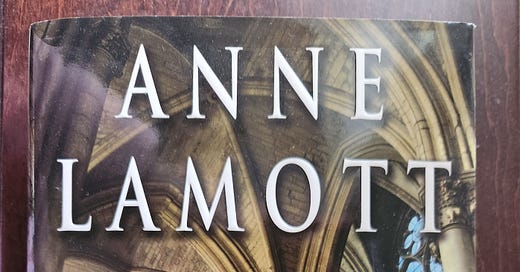First of all, some of you may have noticed that I didn’t make my usual post on Sunday, which had nothing to do with my writing project. Instead, it was the result of “allergies” that had been plaguing me all weekend and turned out to be a very bad cold that hit just as I was getting ready to write for all of you. So, today’s post is a bit of a cheat because it’s really the Mother’s Day post I had meant to write for you.
I was thinking about mothers in literature—I’m sure you can come up with some of the usual suspects yourself—but my thinking veered toward who writes best about motherhood, and there was only one answer to that question: Anne Lamott. I read her memoir Operating Instructions maybe six or eight years before becoming a mother myself, but it really stuck with me because gone were the sweet platitudes about motherhood and childbirth that pervade literature before the late 20th century, and in their place were Lamott’s irreverent passages on breast milk and poop and the kind of exhaustion that only new parents understand. There should be a separate word for that kind of exhaustion in English. Let’s work on that.
Operating Instructions is essentially a diary of Lamott’s pregnancy and her first months of single motherhood—the father of her baby was “dramatically less excited than I was to find out I was pregnant” and proceeded to disappear. Unexpectedly, it also became a diary of the last months of her best friend’s life. Although Lamott, in her very Anne Lamottish way, claims to be completely unequipped to do any of this baby-raising thing—”I was just hating Sam there for a while”—her book prepared me better for what to expect when I was expecting than any other book purporting to actually be offering instructions, and she made me laugh a lot, too.
Lamott followed up Operating Instructions with Some Assembly Required when Sam became the father of a son of his own. But she’s probably best known for her book about writing, Bird by Bird. My beat-up old paperback copy has been read and re-read and I can see what the cover looks like in my mind, but even though our 1,000 or so books are pretty well organized, damned if I can find it today to quote from it for you. Anyway, if you know Bird by Bird, you probably know that Lamott is, for one thing, a proponent of “shitty first drafts,” which by itself is worth the price of the book because beginning writers often imagine that the rest of us write first drafts that just need a little polish, and if a shitty first draft is going to discourage you, then you’ll never become a writer. We all write them. Still. Forever. As with Operating Instructions, Lamott, in that famous chapter of Bird by Bird, is throwing open the bathroom door and refusing to hide anything from view.
The first Lamott book I ever read, though, was the first one she wrote: Hard Laughter, a fictionalized account of her father’s struggle with brain cancer and a portrait of their somewhat wacky family. I will never forget the image of the family in the novel eating dinner together every night on their mattress because, I guess, why not? (Answer: crumbs, ants, mice?) Her voice even in this debut was already sharp and funny and disarming in its sudden pivots to the most penetrating observations about people and life. It would be worth another read.
All that said, the subject Lamott has probably written the most about is faith—and here, I have some reading to do. I pulled a copy of Plan B: Further Thoughts on Faith from our bookshelf. It’s one of those books that got passed along to us and never read—probably because it’s a sequel to her book Traveling Mercies, which I must have thought I’d read first. Kirkus Reviews called Traveling Mercies “an anguishing account that also heals” because in it, Lamott lays out the alcohol and drug use that almost killed her, the loss of her father and her friend Pammy, the arrival of Sam, and other trials and the unexpected grace and healing she found in church.
When I opened Plan B, I was of course drawn first to the essay “Sam’s Dad,” in which this story finally has a happy ending because when he is seven, Sam starts asking Anne to find his dad, whose name is John. And she really tries, but every phone call she makes—to his old number, and his father’s house, and his best friend—goes unanswered. She begins to pray. And I swear, I wrote the part above about the bathroom door before I read this:
“Help” is a prayer that is always answered. It doesn’t matter how you pray—with your head bowed in silence, or crying out in grief, or dancing. Churches are good for prayer, but so are garages and cars and mountains and showers and dance floors. Years ago I wrote an essay that began, “Some people think that God is in the details, but I have come to believe that God is in the bathroom.”
Suffice it to say, they eventually find Sam’s dad, and while everything isn’t perfect, “because life is not TV and we are real people with scarred, worried hearts,” it’s a pretty happy ending. So, this is my post-Mother’s Day shout-out for Anne Lamott.
What are you reading this week? Let us know in the comment section below!





I used to use Bird by Bird to teach preaching! She has a lot to say about paying attention that translates well from writing to the oral medium of preaching!
Nice to read about Anne. I loved Bird by Bird and I also enjoyed Blue Shoe.
This week I’m reading The Blue Flowers by Raymond Queneau. It’s funny in a Monty Python or Confederacy of Dunces way. It’s expertly translated from French to English.